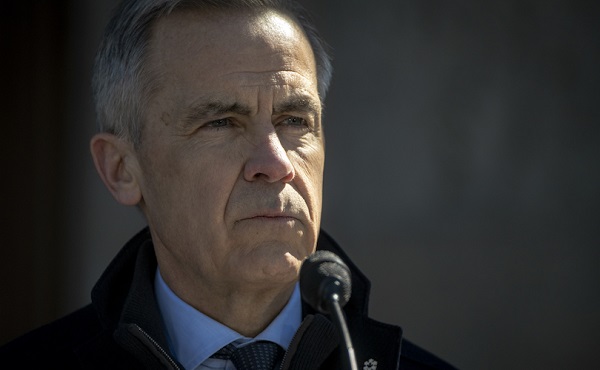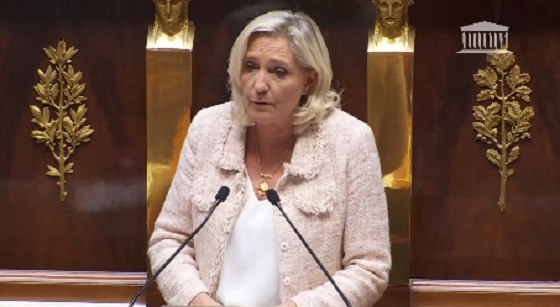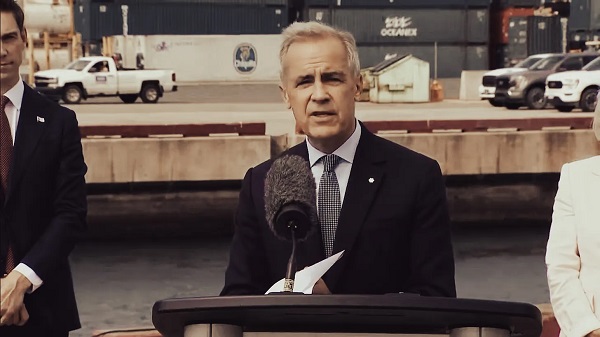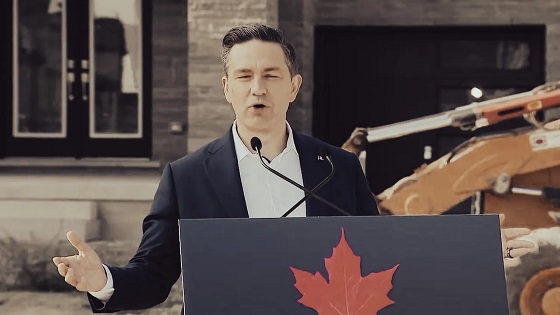Economy
Ruling-Class Energy Ignorance is a Global Wrecking Ball

From the Frontier Centre for Public Policy
By Terry Etam
In the US resides a guy who’s academic and professional credentials are as impressive and impeccable as one can assemble in a career. His Wikipedia professional/academic bio shows top-level roles at a who’s who of globally significant institutions.
Larry Summers has been: student at MIT, PhD from Harvard, US Secretary of the Treasury, director of the National Economic Council, president of Harvard University, Chief Economist of the World Bank, US federal Under Secretary for International Affairs in the Department of Treasury, a managing partner at a hedge fund, and is now on the board of OpenAI.
And yet…just a few weeks ago, Larry Summers made a comment about a bedrock of the economy seems so fundamentally bad that it is enough to shake one’s faith in every one of those institutions. He was talking about whether the US should create a Sovereign Wealth Fund, which is kind of like a national savings account that governments squirrel money into in order to fund future projects or spending requirements. They are very great things indeed, reflecting the wisdom of having savings for a rainy day, but given how politicians love to spend not just the money that they have but everything they can borrow, the idea seems kind of quaintly hopeless in the first place, even though some countries have accomplished it.
But the shocking part of this story is why Summers was against the idea; here’s his quote: “It’s one thing if you’re Norway or the Emirates — that has this huge natural resource that’s going to run out that you’re exporting — to accumulate a big wealth fund. But we’ve got a big trade deficit. We’ve got a big, budget deficit…”
He’s absolutely right about the US’ financial woes; our dear southern neighbour is currently the equivalent of a 28-year-old guy twice divorced with 8 kids between 4 women who is working at the lumber yard and juggles 14 credit cards simultaneously (definitely not implying Canada is much better…).
No, he’s right that those are the biggest fiscal issues to deal with, but what’s crazy is the other part of his statement. He says that Norway and the Emirates should create sovereign wealth funds because they ‘have this huge resource that’s going to run out that you’re exporting’ and thus can/should accumulate a big wealth fund.
Mr. Summers apparently does not understand either depleting natural resources, or the US’ economic powerhouse status due to these resources, or both. Either fact is shocking, given his stature; but his analysis of the situation gives a clue about why major western powers are in such shambles with respect to energy policy.
What Mr. Summers presumably meant is that the US does not have an economy that is dominated by export of a natural resource, such as how oil or natural gas exports are not a fundamental pillar of the economy as with Norway or the Emirates. And yes, the US does have other desperately needed uses for the money derived from exports.
But he seems to think the US is immune from its resources ‘running out’. He doesn’t seem to understand that while the US economy may not be dominated by oil/gas exports, the problem of resource depletion will not matter to the US because it does not dominate the economy. That is the charitable interpretation; the less kind one is that he may well believe that the US will never run out of affordable hydrocarbons.
It’s easy to see where he and other policy makers get the idea. If they think about petroleum reserves at all, they would find coverage in the general mainstream financial press, in publications such as Forbes, a standard of US economic communications that claims over 5 million readers through 43 global editions. The publication is aimed at the who’s who of the financial world: “Forbes is #1 within the business & finance competitive set for reaching influential decision-makers.” It is exactly what a guy like Summers would turn to to understand the US’ resource capability (I doubt he spends much time understanding rock quality).
Here is what Forbes had to say about the US’ hydrocarbon reserves. In an article entitled U.S. Shale Oil and Natural Gas, Underestimated Its Whole Life, the author chronicles how forecasts of US shale potential have been continually underestimating productive capability. Fair enough, that is definitely true. But the extrapolations/conclusions are pretty wild, and, dangerous: “…the reality is that shale production [for both oil and natural gas] has surpassed all expectations namely through the constant advance of technologies and improvement of operations…In fact, the Shale Revolution has shown us that the amount of oil and gas we can produce is essentially unlimited.”
It’s not a bad article on the whole, when it describes how we’ve underestimated shale growth, but these silly concluding assumptions are not good at all. They’re soundbites that reach far more ears because of the source than true expertise from industry journals (including, ahem, this excellent one). Those soundbites are what lodge in the minds of people like Larry Summers when he huddles with his global cohort to discuss energy policy.
Consider as an alternative analysis something far more thoughtful and thus less dead-certain, such as the work of Novi Labs, who put out incredibly detailed reports that analyze production trends, with a key difference from Forbes: Novi bases their projections on actual well data, well spacing, well productivity, well length, gas/oil ratios, rock quality, and many other parameters. For example, Novi recently published a paper entitled “Analyzing Midland Basin Well Performance and Future Outlook with Machine Learning” in which they conclude that, based on the above parameters and more, that the Midland Basin has about 25,000 future locations remaining, and breaks them out into prices required to develop them, and has the wisdom to conclude: “Due to the Permian Basin’s role as the marginal growth barrel, overestimating the remaining resources will have consequences spanning from price spikes to energy security and geopolitics.”
Based on such incredibly detailed analyses, Novi is comfortable making, for example, Permian oil/gas production out to the year 2030.
Forbes is comfortable making oil/gas production forecasts to infinity, based on nothing more than a string of failed projections.
And people head off into the highest levels of government having read Forbes but not Novi. And we get Germany. And Canada. And etc.
This isn’t a question about whether we will “run out of oil”. The surest way to rile an audience it seems – just behind challenging EV superiority – is to question the ultimate productive capability of hydrocarbon resources. “Peak oil” is now a term of derision, in some ways rightly so because many smart people have, over time, warned that resources are about to run out.
It does seem erroneous to think that way, because as prices for something rise, more exploration will occur, and by definition we don’t know what those discoveries will encounter. Could be a little, could be a lot.
The point here is best explained by way of a real life example. A long time ago, late last century, natural gas was dirt cheap across western Canada. (Bizarrely, it’s even cheaper now, but not consistently so.) In Saskatchewan where (and when) I grew up, an alfalfa processing industry had developed that was a godsend to many small communities. Farmers would grow alfalfa and dedicate the output to a local (often community owned) alfalfa-processing facility that would convert green alfalfa into nutrient-rich pellets for which Japan (primarily) had a seemingly insatiable appetite.
The whole business existed because of the availability of cheap natural gas, which allowed for the rapid and economical dehydration of the green alfalfa; huge drying drums ran around the clock, all summer long, turning huge piles of fresh chopped-alfalfa salad into dried out pellets within 12 hours.
But then natural gas prices soared to unprecedented levels, over $10/GJ, and found a new average that was probably about twice the average in the 1980s and 1990s. This spike in natural gas prices wiped out the entire industry. Every little town lost a pillar of the community, investors lost investments, municipalities lost tax revenue, and hundreds or maybe even thousands of punks like me lost summer job opportunities.
THAT is what people like Larry Summers should be thinking about when they talk of, or heaven forbid ask questions about, the longevity of our hydrocarbon resources. Yes, there will be oil and natural gas reserves forever – but at what price? And what will the consequences of higher prices be?
In the spring of 2022, some large US trade associations issued warnings about the consequences of higher natural gas prices. “Last winter’s heating bills were unsustainable,” said the CEO of the Western Equipment Dealers Association. The winter to which he was referring, 2021-22, had average Henry Hub prices of $4.56/mmbtu – far higher than today, but a number that will probably be required over the long term to enable continued US reservoir development and feed LNG export demand.
That price level of which the CEO was frightened of, it is well worth noting, is a fraction of the global price of LNG. In other words, US industry will freak out if it has to pay even half of what the rest of the world does.
At a time when the US is desperate to ‘onshore’ a lot of manufacturing capacity, policy makers should be very careful about ‘what they know for sure’ about the future of US and Canadian energy productive capability.
Energy ignorance, at these levels of government, are getting deadly. I mean, we can all see Germany, right? It’s turning slapstick, what they’re doing to energy policy, and so many western leaders seem intent on following them. Force the closure of baseload power, force the adoption of intermittent power, watch AI buy up all the power from nuclear sources, claim to support new nuclear power which everyone knows won’t get here for a few decades, then trot off to an annual fall climate conference to tell the world what to do next.
As Mark Twain said, “It ain’t what you don’t know that gets you in trouble. It’s what you know for sure that just ain’t so.”
Terry Etam is a columnist with the BOE Report, a leading energy industry newsletter based in Calgary. He is the author of The End of Fossil Fuel Insanity. You can watch his Policy on the Frontier session from May 5, 2022 here.
Business
Global elites insisting on digital currency to phase out cash

From LifeSiteNews
By David James
The aim is to have the digital euro fully in place by 2030 in order to move Europe fully into the United Nations’ post-capitalist system described in Agenda 2030.
It always pays to scrutinize closely the comments of financial elites because they are rarely honest about their intentions. An instance is the comments of Christine Lagarde, president of the European Central Bank (ECB) who said there will be a vote next month in the European Union parliament on the next step toward creating a digital euro, which would be a central bank digital currency (CBDC).
A central bank digital currency is money issued by the central bank in digital form as opposed to digital credit issued by banks, which is the dominant form of money in Western societies. She claims that it will mean more freedom for Europeans and that there is nothing to fear.
Lagarde anticipates launching the digital euro in about 18 months. The aim is to have it fully in place by 2030 in order to move Europe fully into the United Nations’ post-capitalist system that is described in Agenda 2030.
Lagarde’s blandishments about what the digital euro represents do not survive close examination. She acknowledged that the main concern of the population is the privacy implications, claiming the ECB is looking at a technology that will offer protections. The private banks, she said, will apply the “rules of scrutiny” that already have access to the transactions. “We are not interested in the data. The private banks are interested in the data.”
Lagarde also said that the “people have dictated” the transition to a digital euro. This looks dubious. Neither the EU Commission nor the ECB is democratically elected. And if the main concern people have with a CBDC is privacy, then why would people prefer it over cash, which is immune to scrutiny? It is not as if a digital euro would satisfy an unmet need. Digital money – credit and online transactions – is already freely available in the banking system.
The ECB is also speaking out of both sides of its mouth, saying on one hand that the digital euro will only complement cash and on the other that cash will be eliminated.
Lagarde made it clear that the aim is to phase out cash completely. Agenda 2030, she claims, “can only be enforced in a cashless economy.” Why? What is it about cash that makes environmental policies impossible to implement? The answer is surely that a digital euro is needed to control people’s behavior, forcing them to comply with environmental rules.
Previous comments by central bankers suggest there is good reason for Europeans to be extremely suspicious. In 2021, the general manager of the Bank for International Settlements, Agustín Carstens, said: “We don’t know who’s using a $100 bill today and we don’t know who’s using a 1,000-peso bill today. The key difference with the CBDC is the central bank will have absolute control on the rules and regulations that will determine the use of that expression of central bank liability, and also we will have the technology to enforce that.”
The pretext for the financial power play is climate change and the push toward net zero. A European CBDC is not, as implied by Lagarde, the creation of a new digital monetary mechanism. As economist Richard Werner points out, that already exists – credit and debit cards, for example. The significance of a digital euro is that it threatens the banking system.
A CBDC, like cash, has no interest rate on it. So why would people continue to use credit produced by private entities such as banks or credit card companies – currently over 95 percent of the money supply – on which they have to pay interest? As the Reserve Bank of New Zealand noted, CBDCs have the potential to destroy private banks.
That problem does not seem to concern the ECB, however. Indeed, fundamentally altering the banking system may be what they are aiming for. Lagarde said “climate compliance” will become a core element of bank supervision, not a separate initiative, “because climate change presents significant, material financial risks to banks and the entire financial system.”
The ECB’s supervision will mandate that banks integrate the management of climate-related and environmental risks into their existing risk management processes, particularly through new prudential transition planning requirements under what is called CRD VI. European banking, it seems, will no longer be defined by profitability and fiscal soundness but also by the politics of climate change.
The slipperiness of the ECB‘s arguments point to a much darker ambition. Werner says when CBDCs are connected to digital IDs “we are talking about the most totalitarian control system in human history … it gives you as a controller complete visibility on what everyone is doing, every transaction.
“The monitoring is only one aspect. These CBDCs are programmable and you can use big data algorithms, which they sell to us as artificial intelligence, in order to have rules about who can buy what and for what purpose, at what time and at what place – and therefore control all your movement. In the history of dictatorships, there never has been such a powerful control tool.”
There is a flaw, though, in the ECB’s push to change Europe’s financial architecture that may prove fatal to its ambitions. The EU and ECB do not have genuine central control. When the euro was established in 1998, the only way Germany was able to join was on the condition there was no consolidation of the government debt. So, although the ECB notionally sets interest rates for the zone, government debt is held at the national level and each country’s interest rate differs.
The ECB is thus a central bank in name only, unlike the U.S. Federal Reserve, or for that matter most country’s central banks, that oversee their national government debt. A European nation can choose to exit the EU, and each has to have its own monetary policy in spite of the ECB setting a uniform rate.
The push to create a digital euro is most likely an attempt to deal with these contradictions, but at best it will be a makeshift solution and it will take very little for it to fall apart. Disintegration of the European Union, and the common currency, is not out of the question.
Meanwhile, the U.S. is going in the opposite direction. In July, the U.S. House of Representatives passed the Anti-CBDC Surveillance State Act, which prevents the Federal Reserve from issuing a retail CBDC directly to individuals.
European debt is becoming increasingly parlous, especially in France where there have even been suggestions that there might need to be assistance from the International Monetary Fund. Italy’s debt, which is 138 percent of GDP, is also problematic. Lagarde is hoping for a rollout of the digital euro in 2027 and completion in 2030. But the Euro zone, and the ECB that oversees it, may not last that long.
Business
Upcoming federal budget likely to increase—not reduce—policy uncertainty

From the Fraser Institute
By Tegan Hill and Grady Munro
The government is opening the door to cronyism, favouritism and potentially outright corruption
In the midst of budget consultations, the Carney government hopes its upcoming fall budget will provide “certainty” to investors. While Canada desperately needs to attract more investment, the government’s plan thus far may actually make Canada less attractive to investors.
Canada faces serious economic challenges. In recent years, the economy (measured on an inflation-adjusted per-person basis) has grown at its slowest rate since the Great Depression. And living standards have hardly improved over the last decade.
At the heart of this economic stagnation is a collapse in business investment, which is necessary to equip Canadian workers with the tools and technology to produce more and provide higher quality goods and services. Indeed, from 2014 to 2022, inflation-adjusted business investment (excluding residential construction) per worker in Canada declined (on average) by 2.3 per cent annually. For perspective, business investment per worker increased (on average) by 2.8 per cent annually from 2000 to 2014.
While there are many factors that contribute to this decline, uncertainty around government policy and regulation is certainly one. For example, investors surveyed in both the mining and energy sectors consistently highlight policy and regulatory uncertainty as a key factor that deters investment. And investors indicate that uncertainty on regulations is higher in Canadian provinces than in U.S. states, which can lead to future declines in economic growth and employment. Given this, the Carney government is right to try and provide greater certainty for investors.
But the upcoming federal budget will likely do the exact opposite.
According to Liberal MPs involved in the budget consultation process, the budget will expand on themes laid out in the recently-passed Building Canada Act (a.k.a. Bill C-5), while also putting new rules into place that signal where the government wants investment to be focused.
This is the wrong approach. Bill C-5 is intended to help improve regulatory certainty by speeding up the approval process for projects that cabinet deems to be in the “national interest” while also allowing cabinet to override existing laws, regulations and guidelines to facilitate such projects. In other words, the legislation gives cabinet the power to pick winners and losers based on vague criteria and priorities rather than reducing the regulatory burden for all businesses.
Put simply, the government is opening the door to cronyism, favouritism and potentially outright corruption. This won’t improve certainty; it will instead introduce further ambiguity into the system and make Canada even less attractive to investment.
In addition to the regulatory side, the budget will likely deter investment by projecting massive deficits in the coming years and adding considerably to federal debt. In fact, based on the government’s election platform, the government planned to run deficits totalling $224.8 billion over the next four years—and that’s before the government pledged tens of billions more in additional defence spending.
A growing debt burden can deter investment in two ways. First, when governments run deficits they increase demand for borrowing by competing with the private sector for resources. This can raise interest rates for the government and private sector alike, which lowers the amount of private investment into the economy. Second, a rising debt burden raises the risk that governments will need to increase taxes in the future to pay off debt or finance their growing interest payments. The threat of higher taxes, which would reduce returns on investment, can deter businesses from investing in Canada today.
Much is riding on the Carney government’s upcoming budget, which will set the tone for federal policy over the coming years. To attract greater investment and help address Canada’s economic challenges, the government should provide greater certainty for businesses. That means reining in spending, massive deficits and reducing the regulatory burden for all businesses—not more of the same.
-

 Crime2 days ago
Crime2 days agoDown the Charlie Kirk Murder Rabbit Hole
-

 Daily Caller1 day ago
Daily Caller1 day agoTrump Admin To Push UN Overhaul Of ‘Haphazard And Chaotic’ Refugee Policy
-

 Business1 day ago
Business1 day agoCarney’s Ethics Test: Opposition MP’s To Challenge Prime Minister’s Financial Ties to China
-

 Business2 days ago
Business2 days agoIt’s time to finally free the beer
-

 Artificial Intelligence2 days ago
Artificial Intelligence2 days agoWhat are data centers and why do they matter?
-

 Business1 day ago
Business1 day agoCarney Admits Deficit Will Top $61.9 Billion, Unveils New Housing Bureaucracy
-

 Business23 hours ago
Business23 hours agoAttrition doesn’t go far enough, taxpayers need real cuts
-

 Business22 hours ago
Business22 hours agoCarney government’s housing GST rebate doesn’t go far enough








